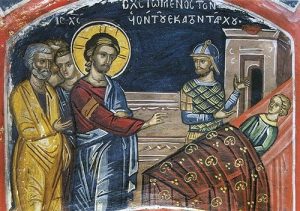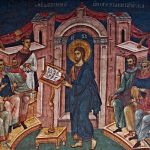Jesus, Prophet of Amnesty
Luke 1; 4:14-21
“The Spirit of the Lord is upon me,
because he has anointed me
to bring good news to the poor.
He has sent me to proclaim release to the captives
and recovery of sight to the blind,
to let the oppressed go free,
to proclaim the year of the Lord’s favour.”
1.
This morning we hear Jesus’ crashing proclamation in the Nazareth synagogue—the so-called Nazareth Manifesto. The Spirit of the Lord is upon me, for he has anointed me to bring good tidings to the poor. I don’t know why, exactly, scholars have taken to calling this address a ‘manifesto’: perhaps because, like the Communist manifesto, it calls us to throw off our chains.
This gospel has a political flavour. Religion is not always about quiet, or meditation, or mystical moods; sometimes it gets active.
It begins with Mary’s great song of revolution: “the Lord has shown strength with his arm, and scattered the proud in the imagination of their hearts; he has put down the mighty from their thrones, and exalted the humble and meek.” You will have heard it, perhaps richly brocaded in a Cathedral musical setting. Its radicality tends to escape us!
And now, in the synagogue, Jesus says that he has come to pronounce the year of the Lord’s favour. The reference is to the great Jubilee year, the fiftieth year, of which the Book of Leviticus speaks as a great year of debt forgiveness (Lev 25). Israelites were to write off their debts, forgiving others for the sake of their shared humanity—to seek out the lost and bring them home.
Jesus comes to proclaim the Jubilee. He is a prophet of Jubilee—proclaiming amnesty, homecoming, and table-fellowship with those the world calls sinners.
2.
 This means, above all, that he preaches mercy. In this gospel we read “be merciful, as your father in heaven is merciful.” (Lk 6:36) Sometimes this is translated be compassionate. Jesus says to us that the merciful person, who writes off bad debts, shows forth the nature of God.
This means, above all, that he preaches mercy. In this gospel we read “be merciful, as your father in heaven is merciful.” (Lk 6:36) Sometimes this is translated be compassionate. Jesus says to us that the merciful person, who writes off bad debts, shows forth the nature of God.
Consider Jesus’ compassionate regard for those who live outside respectability: he visits a Roman Centurion, who lives with his servant (pais in Greek), in what some scholars have said was a same-sex relationship. He has compassion, too, for a “sinful woman” even as she wipes his feet with her hair and kisses them. Was she a prostitute? Some have thought so. But Jesus says simply “her many sins have been forgiven—as her great love [to me] proves. She who is forgiven much loves much; but she who is forgiven little loves little.”
What Jesus would teach us, in stories like this, is that we strengthen the bond of love—we strengthen the social bond—when we show mercy, but we weaken it when we insist on strict justice. Isn’t this a lesson we as a society need to hear? Don’t we live in a society obsessed with getting every last dollar in restitution from anyone who offends us?
Luke, more than Mark, more than Matthew, is the gospel of mercy.
Think of the story of the Prodigal Son (or, we might say, the reckless son, or even the rebellious teen). You see how his father welcomes the son in spite of all. He writes off all his debts, saying
‘Quick! Bring the best robe and put it on him. Put a ring on his finger and sandals on his feet. 23 Bring the fattened calf and kill it. Let’s have a feast and celebrate. 24 For this son of mine was dead and is alive again; he was lost and is found.
This is the imperative of mercy, in spite of everything. This is the spirit of Jubilee!
3.
 If mercy is the supreme virtue—then what does that make of our ethics? What does it say about us, who have kept the rules so carefully? What does it say if we happen to be a Pharisee, or a fundamentalist Christian? It might shock us into realising that, maybe, those we’ve maligned as “sinners,” God regards more highly even than us. Yes, perhaps they themselves have shown mercy.
If mercy is the supreme virtue—then what does that make of our ethics? What does it say about us, who have kept the rules so carefully? What does it say if we happen to be a Pharisee, or a fundamentalist Christian? It might shock us into realising that, maybe, those we’ve maligned as “sinners,” God regards more highly even than us. Yes, perhaps they themselves have shown mercy.
Isn’t this the meaning of the story of the Good Samaritan? Even a foreigner, a Samaritan, with strange habits of worship, a man who does not set foot in the Temple or even share the same scriptures—he is, in God’s eyes, more righteous than the Pharisees, because he tends and cares for a man who lies bleeding in the street. The Pharisees pass by on the other side.
Always we can count on Luke’s Jesus to destabilise the righteous. We can count on him to destabilise the Church itself—for haven’t we ourselves invested far too much time elaborating rules, while we ignore the supreme virtue of mercy, of compassion? I believe so.
But always the Lord of the Church bids us make a fresh start. What can we do?
See how Jesus enacts the Jubilee values of amnesty and homecoming: very often, he dines with those called “sinners”. He spends time with them over a meal. He re-establishes friendship, he makes communion; he makes a way. Love makes a way.
When you hold a banquet, we read, invite the poor, the crippled, the lame and the blind, and you will be blessed. Although they cannot repay you, you will be repaid at the resurrection of the righteous.
The Archbishop has declared 2019 to be the year of generous hospitality. So surely we should be thinking about how we can reconnect with people whom society has alienated, and people who the Church itself has alienated—women, divorced people, single people, LGBT people.
How can we make this a year of Jubilee, in the tradition of Luke’s Jesus? I invite your suggestions.
So may we be merciful, as our father in heaven is merciful—and may we be challenged, in this year of Luke, to think more radically about our faith.
Amen.

